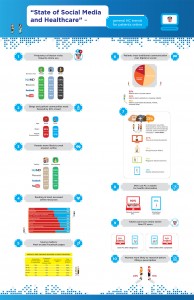
As the Web Goes Mobile, Healthcare Stands Still, sums up a survey from Makovsky Health and Kelton. Their research finds that, while consumers have beloved relationships with their mobile devices (phones and tablets) and use them regularly for aspects of daily living, healthcare information search is still largely managed via desktop and laptop computers.
The infographic organizes some of Makovsky-Kelton’s findings. Of note is that parents are more likely to seek health answers online, Wikipedia has gained in health use since 2011, women are more likely than men to research before filling a prescription, and recommendations from friends and family are more powerful as health referral sources than TV ads, drug discounts, magazine ads, and digital ads.
90% of U.S. adults are most likely to use a PC to seek online information, with 7% using smartphones and 4%, tablets. Following a diagnosis from a physician, PC-using consumers are also more likely than mobile health users to visit a pharma website (52% compared to 31%). However, tablet and smartphone users are more likely to visit a pharma website after they experience symptoms (43% compared to 24%). Thus, mobile health users may be more self-reliant on self-diagnosis than PC users are.
56% of American adults use WebMD to seek out health care information. When it comes to trust, WebMD is the most trusted online source along with government health websites such as the CDC and FDA, and those sponsored by health advocacy organizations, such as the American Heart Association and the American Diabetes Association.
31% of people turn to Wikipedia for health information, now one of the most trusted online sources for health — an increase of 13% since Makovsky conducted this survey in 2011. An additional 29% of people look to health magazine websites online, such as Prevention and Women’s Health.
Social networks are not widely used for health, compared with these other sources. 17% of U.S. adults use Facebook for health, 15% YouTube, 13% blogs, and 6% Twitter linked to other resources.
Makovsky-Kelton surveyed 1,001 U.S. adults over 18 in July 2012.
Health Populi’s Hot Points: One of the most intriguing findings from this poll is that mobile health consumers seem to be more self-diagnosing and self-reliant than health citizens who tend to use computers for health information seeking. Under this statistic there are underlying factors that aren’t yet understood, such as demographic differences such as education, income, gender, and parent status. We know that Moms tend to be more mobile when it comes to health, for example. This is Generation HealthcareDIY, and it’s not just young people doin’-health-for-themselves. Ask any member of ACOR, the resilient online cancer community which crosses ages, stages of cancer, and socioeconomic cohorts, and you will see this in action.
The challenge for health marketers is how to allocate communications and health education resources in this multi-screen, multi-messaging environment. The topline message from this study is, “don’t assume all health consumers are mobile when it comes to health.” Most people are mainly mobile for seeking out movie theatres, buying on Amazon, and checking out the closest coffee shop. For health search, it’s still a computer-based world, Makovsky-Kelton say.
We’ll be able to contrast this data soon when Susannah Fox’s Pew Internet & American Life survey on health reveals their updated survey data. Until then, my advice: allocate resources based on deep insights into targeted health populations to optimize ROI and health outcomes.





 Grateful to Gregg Malkary for inviting me to join his podcast
Grateful to Gregg Malkary for inviting me to join his podcast  This conversation with Lynn Hanessian, chief strategist at Edelman, rings truer in today's context than on the day we recorded it. We're
This conversation with Lynn Hanessian, chief strategist at Edelman, rings truer in today's context than on the day we recorded it. We're